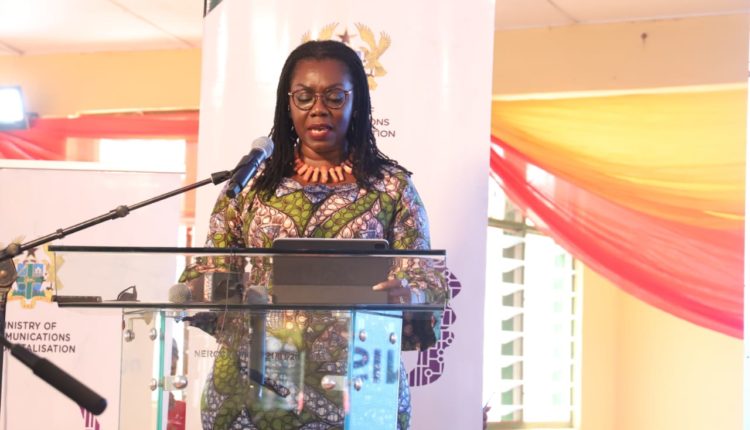There must be a deliberate and continuous effort to sustain the progress made with Africa Continental Free Trade Agreement (AfCFTA) and looking forward to more progress to help the Africa continent on a better side of economic activities.
This is according to the Minister of Communications and Digitalisation and Member of Parliament for the Ablekuma West constituency, Hon. Ursula Owusu-Ekuful.
She believes more investment into the area of digitalization will help with such sustainability and also better Africa with its own identity in all areas.
She made this known at the 74th edition of the annual New Year School and Conference by the University of Ghana in Accra under the topic, “Digital Technology Development Preparedness for AfCFTA” on Tuesday, January 18, 2023.
“In order for the Africa Continental Free Trade Agreement AfCFTA to succeed, it must develop and harmonise its member State’s digital policies and regulations, invest in digitalization and support the implementation of digital trade, digital identity and digital economy. We also need a robust cross border electronic/digital payment system. We must develop our own.
“As part of AfCFTA’s mandate to eliminate trade barriers and boost intra-Africa trade, the AfCFTA Hub has been initiated as a single electronic gateway connecting e-government portals, business & consumer apps and supranational platforms into one continental digital ecosystem. By building trust across channels and networks, the AfCFTA Hub will simplify AfCFTA for SMEs and startups, level the playing field in e-commerce & e-logistics so everyone can participate and benefit, minimize fraud, and bind the common market together, delivering prosperity to every fingertip, doorstep and hilltop.”
She added, “The AfCFTA Hub project seeks to digitise collaboration among key national and regional actors to accelerate the implementation of the AfCFTA (Africa Continental Free Trade Agreement). At the heart of the AfCFTA Hub system is the idea of an “AfCFTA Number”, a trusted business identifier for Small & Medium Enterprises (SMEs), startups and other economic actors. The AfCFTA Number is a unique code per business model designed to lead to a Trusted Business Directory of economic actors that are compliant with the necessary regulatory criteria for doing business.”
AfCFTA is Crucial
She indicated that the African Continental Free Trade Area is a crucial framework for Africa member states to develop and harmonize their trade policies including digital policies and regulations, in addition to working together to boost trade on the continent.
“In order to achieve the goal of AfCFTA, creating a business- and investment-friendly policy and regulatory environment, constructing the necessary hard and soft infrastructure, utilising digital technologies to improve service delivery, and establishing public-private partnerships to maximise resources and share expertise are additional ways that governments can promote digital inclusion and eventually the digital transformation of the continent. There are many compelling reasons why African governments and other key stakeholders need to address the digital divide in their countries.
“Failure to do so will lead to these countries falling further and further behind their peers in other parts of the world, with severe consequences for trade and investment performance and social stability. We are pushing forward with AfCFTA with our eyes wide open. Fully aware of past dashed hopes and the pitfalls of globalisation. We are moving forward with AfCFTA knowing full well that without efforts to truly bring down the barriers obstructing integration across Africa, we will get nowhere. We are pressing forward with AfCFTA in the clear knowledge that trade takes capacity and know-how. It is only through digitally enhanced intra African trade that we can achieve a self-sufficient Africa beyond Aid. It seems like a distant dream but it is achievable however, we need to act now.”
She further cited Government’s digitalisation initiative, which has catapulted Ghana to one of the leading digital economies in Africa, as an example of how the government is transforming the economic architecture of the Ghanaian economy ahead of the impending global economic revolution.
Progress in digitalization
In addition, the lawmaker said nothing will stop the Akufo-Addo administration from making Ghana the digital enabler, and place of bridging the digital gap for other Africa countries with the use of AfCFTA.
“For all these reasons and many more, we have decided in Ghana, as the host and one of the earliest proponents of the AfCFTA, that we will not allow the old excuses of inertia, lack of capacity, resources and solidarity to continue hamstringing our forward march as a continent. So long as Ghana continues to have influence in the affairs of this continent, we are committed to promoting, as aggressively as possible, the use of digital technology as an enabler, catalyst, resource gap bridger, coordinating mechanism, playing field leveller, and dots connector in making the AfCFTA experience completely different from anything that has preceded it in the decades long quest for African economic and political unity.
“That is why through this government’s Trancop policy, we wholeheartedly embraced the creation and rollout of the AfCFTA Hub platform to generate digital resources for all the key actors and stakeholders in Ghana involved in one way or another in making the AfCFTA a success”.


Comments are closed.